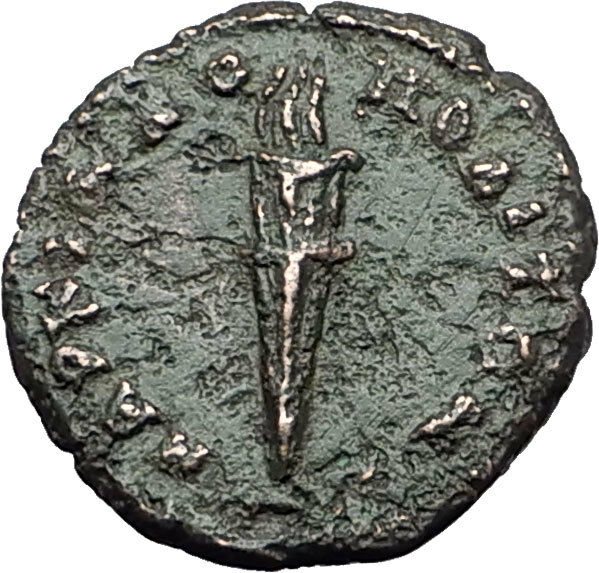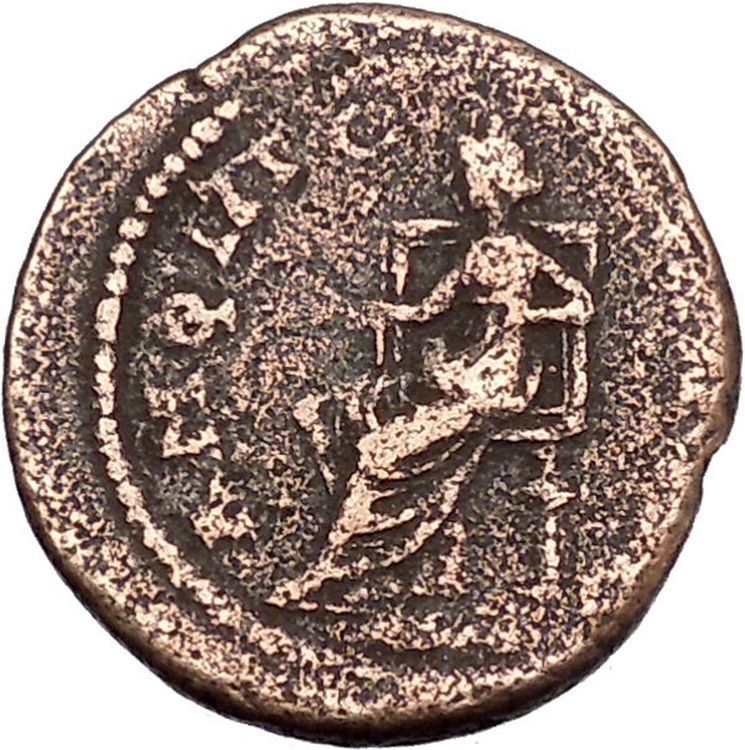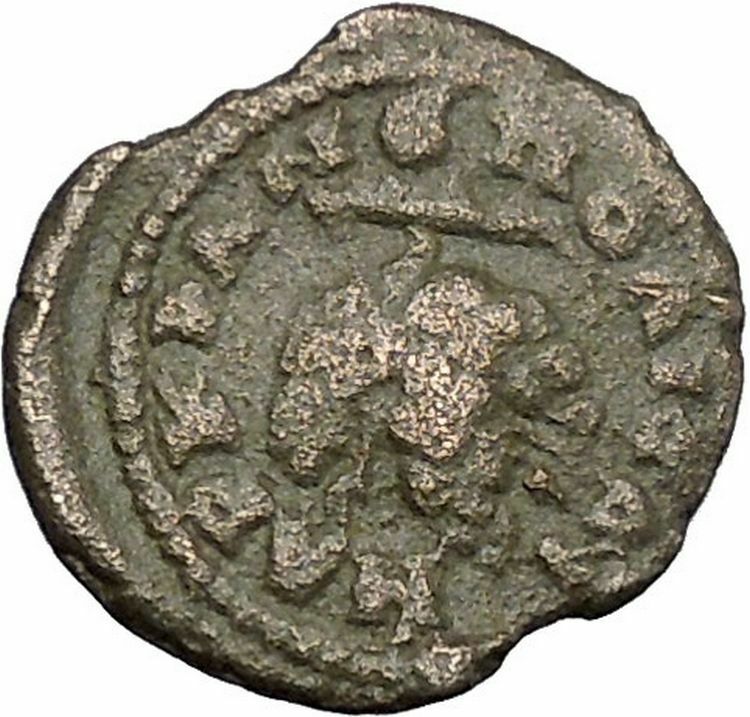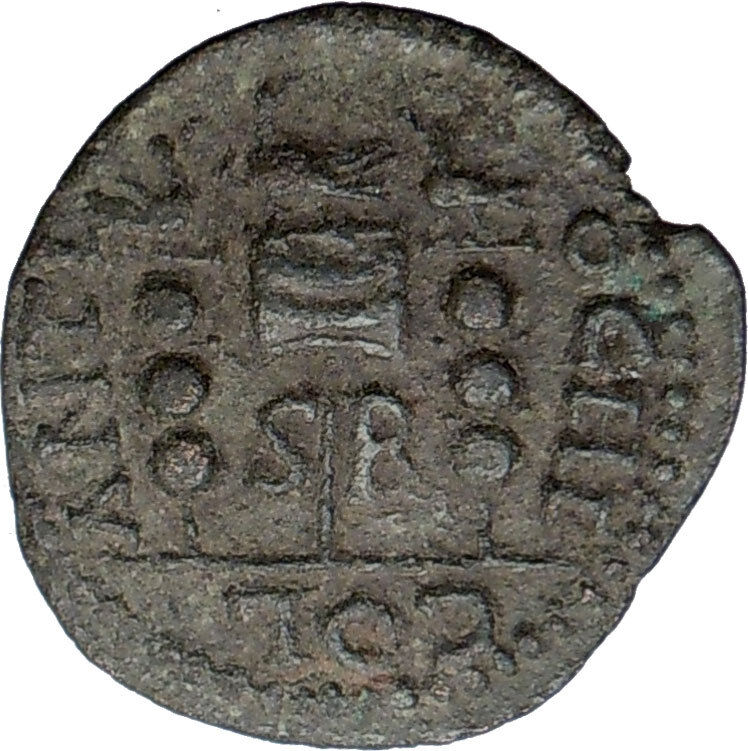|
Severus Alexander –
Roman Emperor: 222-235 A.D.
Bronze 26mm (8.00 grams) of
Nisibis in
Mesopotamia
Reference: SNG Cop 234, BMC 120.5
Laureate bust right, slight drapery.
Turreted, veiled, and draped bust of Tyche right; above, ram (Aries) leaping
right, head left; stars behind and before.
You are bidding on the exact item pictured,
provided with a Certificate of Authenticity and Lifetime Guarantee of
Authenticity.
Tyche (Greek for luck; the Roman equivalent was
Fortuna
) was the presiding
tutelary deity
that governed the fortune and
prosperity of a city, its destiny. Increasingly during the Hellenistic period,
cities had their own specific iconic version of Tyche, wearing a
mural crown
(a crown like the walls of the
city).

The
Greek historian Polybius
believed that when no cause can be
discovered to events such as floods, droughts, frosts or even in politics, then
the cause of these events may be fairly attributed to Tyche.
Stylianos Spyridakis concisely expressed Tyche’s appeal in a
Hellenistic world of arbitrary violence and unmeaning reverses: “In the
turbulent years of the
Epigoni of Alexander
, an awareness of the
instability of human affairs led people to believe that Tyche, the blind
mistress of Fortune, governed mankind with an inconstancy which explained the
vicissitudes of the time.”
In literature, she might be given various genealogies, as a daughter of
Hermes
and
Aphrodite
, or considered as one of the
Oceanids
, daughters of
Oceanus
and
Tethys
, or of
Zeus. She was connected with
Nemesis
and
Agathos Daimon
(“good spirit”).
She was uniquely venerated at
Itanos
in Crete, as Tyche Protogeneia,
linked with the Athenian
Protogeneia
(“firstborn”), daughter of
Erechtheus
, whose self-sacrifice saved the
city.
She had temples at
Caesarea Maritima
,
Antioch
,
Alexandria
and
Constantinople
. In
Alexandria
the Tychaeon, the temple of
Tyche, was described by
Libanius
as one of the most magnificent of the
entire Hellenistic world.
Tyche appears on many
coins
of the Hellenistic period in the three
centuries before the Christian era, especially from cities in the Aegean.
Unpredictable turns of fortune drive the complicated plotlines of
Hellenistic romances
, such as
Leucippe and Clitophon
or
Daphnis and Chloe
. She experienced a
resurgence in another era of uneasy change, the final days of publicly
sanctioned
Paganism
, between the late-fourth-century
emperors
Julian
and
Theodosius I
who definitively closed the
temples. The effectiveness of her capricious power even achieved respectability
in philosophical circles during that generation, though among poets it was a
commonplace to revile her for a fickle harlot.
In medieval art
, she was depicted as carrying a
cornucopia
, an
emblematic
ship’s rudder, and the
wheel of fortune
, or she may stand on the
wheel, presiding over the entire circle of fate.
The constellation of
Virgo
is sometimes identified as the heavenly
figure of Tyche, as well as other goddesses such as
Demeter
and
Astraea
.
Marcus
Aurelius Severus Alexander (October 1, 208–March 18, 235 AD), commonly
called Alexander Severus, was the last
Roman emperor
(11 March 222–235) of the
Severan dynasty
. Alexander Severus succeeded his cousin,
Elagabalus
upon the latter’s assassination in 222 AD, and was ultimately assassinated
himself, marking the
epoch event
for the
Crisis of the Third Century
—nearly fifty years of disorder, Roman civil
wars, economic chaos, regional rebellions, and external threats that brought the
Empire to near-collapse.
Alexander Severus was the
heir
apparent
to his cousin, the eighteen-year-old Emperor who had been murdered
along with his mother by his own guards—and as a mark of contempt, had their
remains cast into the
Tiber river
. He and his cousin were both grandsons of the influential and
powerful Julia Maesa
, who had arranged for Elagabalus’ acclamation as Emperor by the
famed
Third Gallic Legion
.
A rumor of Alexander’s death circulated, triggering the assassination of
Elagabalus.
Alexander’s reign was marked by troubles. In military conflict against the
rising
Sassanid Empire
, there are mixed accounts, though the Sassanid threat was
checked. However, when campaigning against
Germanic tribes
of
Germania
,
Alexander Severus apparently alienated his legions by trying diplomacy and
bribery, and they assassinated him.
Life
Alexander was born with the name Marcus Julius Gessius Bassianus Alexianus.
Alexander’s father,
Marcus Julius Gessius Marcianus
was a Syrian
Promagistrate
. His mother
Julia Avita Mamaea
was the second daughter of
Julia
Maesa
and Syrian noble
Julius Avitus
and maternal aunt of Emperor
Elagabalus
.
He had an elder sister called Theoclia and little is known about her.
Alexander’s maternal great-aunt was empress
Julia
Domna
(also Maesa’s younger sister) and his great-uncle in marriage was
emperor Lucius
Septimius Severus
. Emperors
Caracalla
and
Publius Septimius Geta
, were his mother’s maternal cousins. In 221,
Alexander’s grandmother, Maesa, persuaded the emperor to adopt his cousin as
successor and make him
Caesar
and Bassianus changed his name to Alexander. In the following
year, on March 11, Elagabalus was murdered, and Alexander was proclaimed emperor
by the
Praetorians
and accepted by the Senate.
When Alexander became emperor, he was young, amiable, well-meaning, and
entirely under the dominion of his mother. Julia Mamaea was a woman of many
virtues, and she surrounded the young emperor with wise counsellors. She watched
over the development of her son’s character and improved the tone of the
administration. On the other hand, she was inordinately jealous. She also
alienated the army by extreme parsimony, and neither she nor her son were strong
enough to impose military discipline. Mutinies became frequent in all parts of
the empire; to one of them the life of the jurist and praetorian praefect
Ulpian
was
sacrificed; another compelled the retirement of
Cassius
Dio
from his command.
On the whole, however, the reign of Alexander was prosperous until the rise,
in the east, of the
Sassanids
. Of the war that followed there are various accounts. (Mommsen
leans to that which is least favourable to the Romans). According to Alexander’s
own dispatch to the senate, he gained great victories. At all events, though the
Sassanids were checked for the time, the conduct of the Roman army showed an
extraordinary lack of discipline. The emperor returned to
Rome and celebrated
a triumph in 233.
The following year he was called to face German invaders in
Gaul, who had
breached the Rhine frontier in several places, destroying forts and over-running
the countryside. Alexander mustered his forces, bringing legions from the
eastern provinces, and crossed the Rhine into Germany on a pontoon bridge.
Initially he attempted to buy the German tribes off, so as to gain time. Whether
this was a wise policy or not, it caused the Roman legionaries to look down on
their emperor as one who was prepared to commit unsoldierly conduct.
Herodian
says “in their opinion Alexander showed no honourable intention to pursue the
war and preferred a life of ease, when he should have marched out to punish the
Germans for their previous insolence”. These circumstances drove the army to
look for a new leader. They chose
Gaius Iulius Verus Maximinus
, a Thracian soldier who had worked his way up
through the ranks.
Following the nomination of Maximinus as emperor, Alexander was slain (on
either March 18 or March 19, 235), together with his mother, in a mutiny of the
Primigenia Legio XXII
. These assassinations secured the throne for
Maximinus.
The death of Alexander is considered as the end of the Principate
system established by
Augustus
.
Although the Principate continued in theory until the reign of
Diocletian
,
Alexander Severus’ death signalled the beginning of the chaotic period known as
the
Crisis of the Third Century
which weakened the empire considerably.
Legacy
Alexander was the last of the Syrian emperors. Under the influence of his
mother, he did much to improve the morals and condition of the people. His
advisers were men like the famous jurist Ulpian, the historian Cassius Dio and a
select board of sixteen senators; a municipal council of fourteen assisted the
urban praefect in administering the affairs of the fourteen districts of Rome.
The luxury and extravagance that had formerly been so prevalent at the court
were put down; the standard of the coinage was raised; taxes were lightened;
literature, art and science were encouraged; the lot of the soldiers was
improved; and, for the convenience of the people, loan offices were instituted
for lending money at a moderate rate of interest.
In religious matters Alexander preserved an open mind. It is said that he was
desirous of erecting a temple to the
founder of
Christianity
, but was dissuaded by the pagan priests.
Marriage
Alexander was married three times. His most famous wife was
Sallustia Orbiana
,
Augusta
, whom he married in 225. He divorced and exiled her in 227,
after her father,
Seius Sallustius
, was executed for attempting to assassinate the emperor.
Another wife was Sulpicia Memmia. Her father was a man of consular rank; her
grandfather’s name was Catulus.
|










